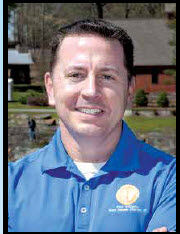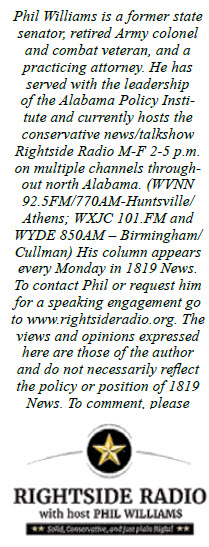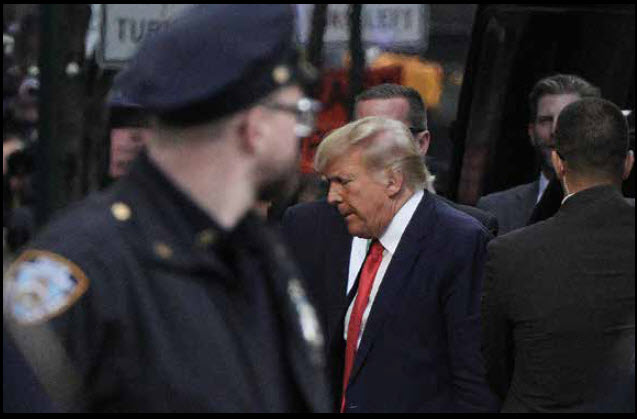 By: Phil Williams
By: Phil Williams
These are strange and often unprecedented times made all the more so as former President of the United States Donald Trump was indicted by District Attorney Alvin Bragg of Manhattan on allegations of campaign misconduct.
As of this writing we haven’t seen the actual indictment yet. When it is unsealed, we will know for certain what the charges are. For now, the understanding is that there are alleged payments made to two women, both porn stars, who allegedly had affairs with Donald Trump in 2006.
DA Alvin Bragg, who has made no bones about his bias toward Trump, made waves soon after being elected to office by issuing word that he will not prosecute certain crimes, among them prostitution. Consider then that this DA will not prosecute paying for sex in the form of prostitution but he will prosecute paying someone not to talk about sex that was consensual. These are strange and unprecedented times indeed.
I am not unconcerned about the morality of a public office holder, especially of one who sits in the Oval Office. I don’t care for such behavior one bit, but the original allegations of infidelity dating back to 2006 are denied by Trump. My chief concern in this writing is the alleged crime being prosecuted: namely that somehow Trump’s campaign benefited from these women being paid for their silence and that therefore a campaign finance reporting violation has occurred.
 Such a legal theory then begs the question as to why Hillary Clinton merely paid a small fine for paying to have the infamous and discredited Steele Dossier prepared and disseminated to benefit her campaign. Shouldn’t we also be concerned as to whether Joe Biden benefited from the shutdown of the Hunter Biden laptop story during his campaign?
Such a legal theory then begs the question as to why Hillary Clinton merely paid a small fine for paying to have the infamous and discredited Steele Dossier prepared and disseminated to benefit her campaign. Shouldn’t we also be concerned as to whether Joe Biden benefited from the shutdown of the Hunter Biden laptop story during his campaign?
There should be no wonder as to why conservatives feel like we are looking at two-tiered system of justice.
As an attorney myself, I have had clients who believed they were aggrieved by others but I had to advise them that the courts were not their true recourse.
I once had a client tell me he wanted to sue someone out of principal. I told him that I wouldn’t do it. Lawyers have rules of professional conduct that govern our profession. Filing suit purely for the purpose of revenge is still no more than revenge.
Within the realm of civil law, the Alabama Code also contains the Litigation Accountability Act which allows someone to sue to recoup their own damages if they can prove that suit was filed against them frivolously.
On another occasion, a client correctly believed he had been wronged and we started the process of litigation, at which point he told me that he was going to file a police report and also try to press criminal charges. I once again had to take a deep breath and tell my client what he did not want to hear. Namely, that the rules of professional conduct stipulate that a lawyer may not threaten criminal action against someone in order to gain the upper hand in a civil action. Sometime later, I found out that he filed a police report anyway without me knowing. Needless to say, I am not his attorney any more.
As an attorney, my job is to zealously pursue and defend my clients’ interests, but I also know that sometimes I have to advise my clients that what they feel is not the same as what they can go to court for. It is for this very reason that lawyers are sometimes referred to as counselors, because we are actually giving counsel, both pro and con.
New York City may be a more liberal venue than beautiful North Alabama but, nonetheless, the even and unbiased application of the law is still supposed to be the rule, and sometimes it is not just the client that needs to hear things that they don’t want to hear. Sometimes the lawyer needs to be told things that go contrary to their own notions.
A good lawyer needs to occasionally step back, objectively look at a case or a prosecution, and make sure that they don’t have their own grievances, emotions, politics, or prejudices wrapped up in it. Somebody should have done that with Alvin Bragg. Someone should have told him that the practice of law is not for vendettas and that lawyers should not be engaged in “lawfare.”
I take pride in being a licensed officer of the court. Pride of profession is there for anyone who practices law and adheres to its legal and ethical standards. Alvin Bragg is supposed to be held to the same rigorous standards and rules of conduct.
My sense is that DA Alvin Bragg may have a reckoning coming his way.
By: Phil Williams






